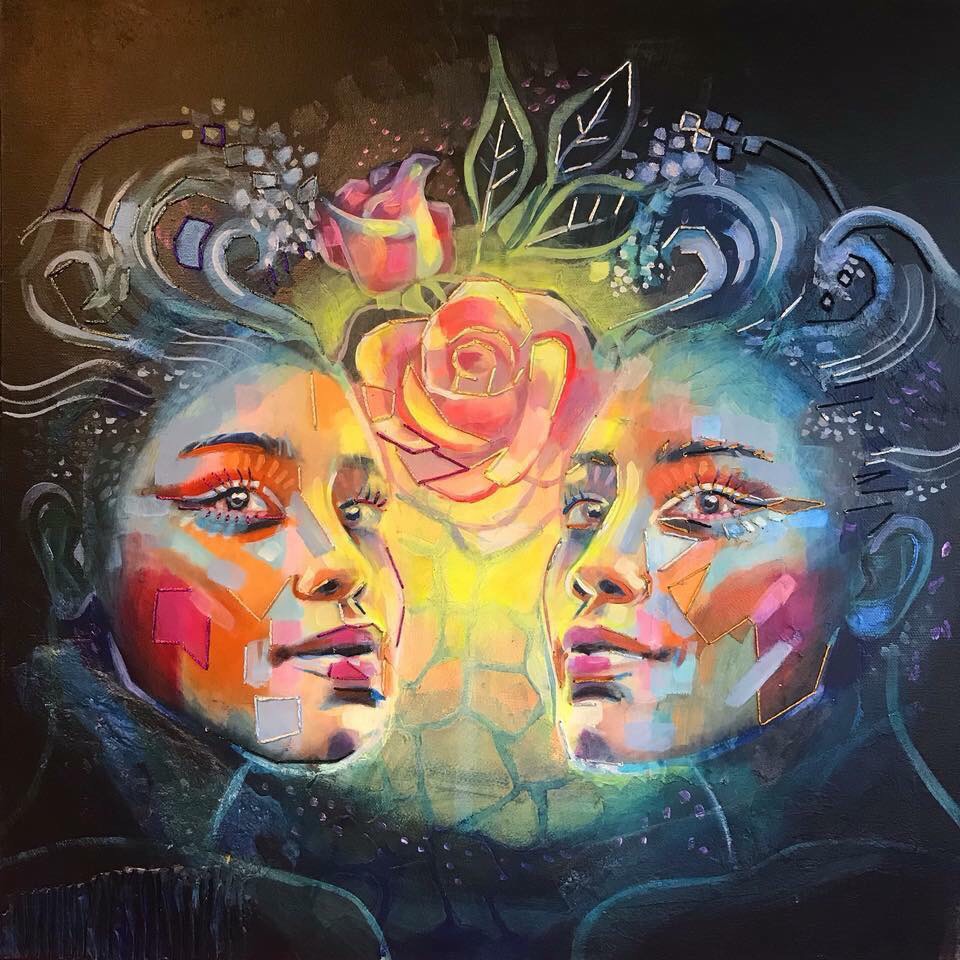I always feared grief or trauma. Thought they would knock me off my high wire and I would have to spend an age mending broken bones before becoming brave enough to climb back up to continue my delicate journey.
I’m eating a bowl of cornflakes in the evening ten months after his death and I can see him sitting opposite me holding my gaze as he chews with his mouth open. That man-child mischief in the corners of his eyes. Sometimes I hear a song on the radio and for a second, it’s him singing and I’m on my knees in the kitchen. Last week I saw a car just like his and I shook for five minutes before feeling strong enough to cross the road.
Moments like this break my heart so wide open that it feels like it isn’t there at all. Half of it at least is quite gone. Not damaged. Not waiting to be healed. Gone. I don’t want it back. I don’t want my chest stitched closed with the hollow lie of wholeness. Sometimes I wonder where it is that it went. I choose to believe (for believe is a choice not a fact) that it went to same place he did. Back to core of warm loving energy at the centre of whatever the universe is. Maybe it will fuse with some unknown force, be born again into something new, be spat out for a second chance. Maybe it will stay there and wait quietly until the rest of me can join it, whispering secrets that I can only half hear.
Trauma is a bad thing. Grief is a bad thing. But what they do to you doesn’t have to be bad. I was on a train to London and the woman opposite me was drawing mind maps in pencil on a brown paper bag. Connecting lines between her hand and my eye, my eye and my mind. I asked her what she did, and she said that she counselled refuges, helped them through their experiences, even experiences of torture. Without me having to explain, she said she knew of my loved one and of how he’d died. I told her it was me who had found him. I told her how I’d fought to help him live. She took my hand in that railway carriage and told me that if we carry the delicate weight of ourselves loosely and lightly enough, trauma can just visit our bodies like a guest who doesn’t burn the house down when they leave.
I don’t want to climb back up to that high wire. I don’t even remember why I was up there or where I was trying to go. I don’t want to stop remembering him when I eat cornflakes or wear red trousers or talk about politics or see a guitar. I don’t want to not be broken. Broken is beautiful because there is no longer fear of the threat of brokenness. To live in a place without fear is to live in a place of love.
I’m no different to any of you. Being human is traumatic. We are a rare animal in our ability to grieve the inevitability of our own death. Accepting it and facing it and dancing with it brings peace. Something amazing happens to us when we stop lying to ourselves about what we believe death is. Truth (and by that word I mean the thing the deepest part of our self longs for and dreads) has a funny way of liberating us. It joins us with the loved ones we have lost or will lose.
When he died a friend in Oregon gave me this poem by Mary Oliver:
The Uses of Sorrow
(In my sleep I dreamed this poem)
Someone I loved once gave me
a box full of darkness.
It took me years to understand
that this too, was a gift.
Such an unlikely gift, and oh such an ugly one. The agony I feel when I allow myself to admit to myself how much I miss him is more acute that anything I would want any of you to have ever experienced. But there’s life in that agony, there’s light in that darkness. Maybe so much life is compacted into such a small space that the only way we can experience it is through pain. Maybe that’s what darkness is: layer after layer after layer after layer after layer of solid opaque light.
As an artist I know that if enough layers of colour overlap, they start to look like darkness. I don’t ever use black paint. There’s no need. When I look at my paintings, I know that those dark areas are where the colour is strongest. Knowing this helps me look at darkness with my heart not my eyes. Glennon Doyle once said that ‘pain is not a hot potato. It’s a travelling professor.’ When it knocks, we open the door, give it the best seat in the house, and sit at its feet until it’s taught us all we have the strength to learn. That sounds backwards because we are taught to run and not look back when we see pain.
An open-hearted approach to pain has strange affects. These past ten months I’ve noticed I’ve been able to taste more flavours than I thought existed. I’ve heard new musical notes. I’ve painted new subjects: women with faces split in two by the agony of grief, staring back at themselves and out at the world with new clarity. I’ve even found new things funny. I know at many points I’ve likely looked like a lunatic. I’ve learnt not to care. Life is difficult. Pain is inevitable. I think we should allow ourselves to look like lunatics if that is the next step of the dance that grief leads us in. Being human and facing the idea of our own death and the deaths of our loved ones is a traumatic experience. We must process all of that in a way that keeps us connected to the present.
If you’re reading this, you are alive and we both have this moment. What price can be put on a moment? But I choose to believe there are other moments too. That moments exist in death itself and on the other side of death. That these moments can be connected to our moment as easily as drawing lines in pencil between circled words on a brown paper bag. I always draws lines between things in pencil; tomorrow I might need to erase them and believe something else.
Emily Garces is an amazing artist, podcaster, writer, and human being. To check out her podcast check out “Hitchhiking with Drunken Nuns” and check out her amazing work at https://emilygarces.com



